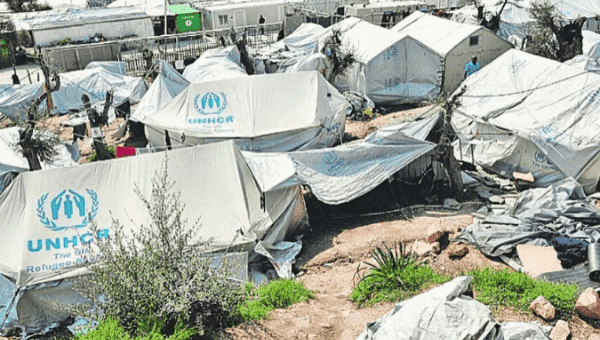
The first coronavirus case in Moria (Greece) stresses the urgent need for a comprehensive integration policy and more security measures.
The EPIC partner Symbiosis and 19 other NGOs issue a press release urging immediate actions to safeguard the health of everyone.
The first COVID-19 case was identified last week in Moria, spiraling concerns about the health and safety of the overcrowded Reception Center’s population.
Taking into consideration the deteriorating situation for recognised refugees in Greece, the undersigned civil society organisations, stress the following concerns about the inhuman treatment of asylum seekers and refugees and the violation of their rights:
- The Moria Center, which can host 2,800 people, currently hosts more than 12.000 asylum seekers and refugees. The Center’s residents, including more than 4,000 children, remain in highly crammed conditions, while more than half live in tents and makeshift shelters in the olive grove, outside the Center. They lack the means to safeguard their health, as no relevant provisions have been implemented by the state either before or during the lockdown under which the facility has been for the past six months. Therefore the Ministry’s announcement that the Center will be put in quarantine neither solves nor answers health concerns and chronic problems. It rather further undermines asylum seekers’ fragile (mental and physical) health, while exposing them to an increased risk of COVID- 19.
- The announcement that the facility’s surveillance will be enhanced, through an increased police presence, bears no consequences for the spread of the virus and does not guarantee the safety of refugees or employees. Instead, it leads to unequal access to fundamental human rights (health, protection, hygiene, etc.), posing a grave danger for their lives.
- The Ministry promotes the construction of “Closed-Controlled” refugee Centres as a “one-size-fits-all” solution. Linking the creation of these Centres with limiting the spread of COVID-19 is ungrounded and amounts to instrumentalising the pandemic to solidify detention and stricter restrictions on asylum seekers as policy tools. As noted by the European Centre for Disease Prevention and Control,[vi] “[w]hilst there is no evidence to suggest that SARS-CoV-2 transmission is higher amongst migrants and refugees, environmental factors such as overcrowding in reception and detention centres may increase their exposure to the disease. Outbreaks in reception and detention centres can also spread quickly in the absence of adequate prevention measures.”
- The highly publicized “decongestion” process of the islands, which has largely amounted to refugees being requested to exit the island camps, without the means to survive, has already proven its inadequacy, intensifying social dumping and exclusion. The starkest examples of this failed policy are the hundreds of people, including mothers with infants, survivors of gender-based violence and families with children, desperately seeking shelter in public spaces in Athens and other mainland/island cities (e.g. Leros and Kos), without state support for even food and water. The 40-year-old refugee who returned to the horrendous conditions in Moria is just one indicative example, vividly depicting the current policy’s effects, while underlining the need for concerted actions at the EU level, based on the principle of responsibility-sharing.
The protection of refugees is an absolute necessity for an effective COVID-19 response in Greece. This should include increased protective measures, the evacuation of the population at high risk from overcrowded facilities and their transfer to safe and adequate accommodation.
Yet it needs to be fully understood that the only comprehensive, human-rights-compliant and long-term solution is the implementation of a concrete and sustainable integration policy in Greece, and a genuine responsibility-sharing mechanism in the EU that will include a strong commitment to relocation on the basis of intra-EU solidarity.
Signatories
- ACTION FOR EDUCATION
- ARE YOU SYRIOUS?
- BOAT REFUGEE FOUNDATION/STICHTING BOOTVLUCHTELING
- DIOTIMA – CENTRE FOR RESEARCH ON WOMEN’S ISSUES
- ECHO100PLUS
- ELIX
- FENIX – HUMANITARIAN LEGAL AID
- GREEK COUNCIL FOR REFUGEES (GCR)
- HELLENIC LEAGUE FOR HUMAN RIGHTS
- HELP REFUGEES
- HIAS HELLAS
- INTERNATIONAL RESCUE COMMITTEE (IRC)
- INTERSOS HELLAS
- LEGAL CENTER LESVOS
- LESVOS SOLIDARITY
- MELISSA
- MOBILE INFO TEAM (MIT)
- NETWORK FOR CHILDREN’S RIGHTS
- REFUGEE LEGAL SUPPORT (RLS)
- SOLIDARITYNOW
- SYMBIOSIS – SCHOOL OF POLITICAL STUDIES IN GREECE
- TERRE DES HOMME HELLAS
Access the full press release here.
Moria refugee camp on the island of Lesbos, Greece. | Photo: AFP